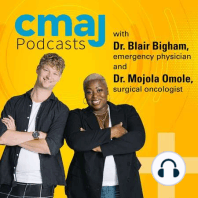24 min listen

Brain injury: scientific records from 1918–1950 align with current knowledge of concussion and CTE
FromCMAJ Podcasts
Brain injury: scientific records from 1918–1950 align with current knowledge of concussion and CTE
FromCMAJ Podcasts
ratings:
Length:
31 minutes
Released:
Feb 4, 2018
Format:
Podcast episode
Description
Repeat concussion, traumatic encephalopathy, head injury, brain damage. These are hot topics, especially in the world of contact sports. While there has been a recent increased awareness of the long-term effects of repeat head injury, our modern understanding may not be that different from what was already known by the 1950sIn this interview, Prof. Stephen Casper, discusses fascinating points in history that helped shape modern understanding of traumatic encephalopathy. He also discusses his take on the problem of brain injury in contact sports and whether kids should even enrol.Prof. Casper is an associate professor of history, humanities and social sciences at Clarkson University in Potsdam, New York. He published a medical humanities article in the Canadian Medical Association Journal.Full medical humanities article: www.cmaj.ca/lookup/doi/10.1503/cmaj.171204To request a transcript of this podcast, contact cmajgroup@cmaj.caSubscribe to CMAJ Podcasts on Apple Podcasts or your favourite podcast app. You can also follow us directly on our SoundCloud page or you can visit www.cmaj.ca/page/multimedia/podcasts.
Released:
Feb 4, 2018
Format:
Podcast episode
Titles in the series (100)
Clarithromycin and statins, Aboriginal patients, hep C screening, ebola & travel restrictions & more by CMAJ Podcasts